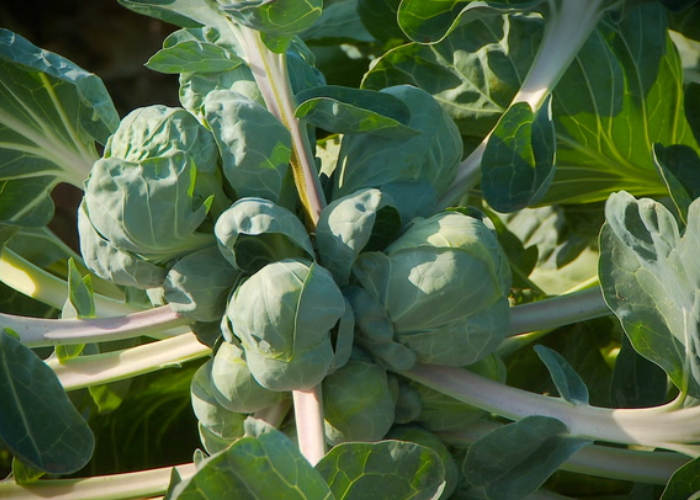Companion planting is an age-old practice of planting different crops in close proximity to each other in order to maximize the benefits of the growing space. Companion plants for Brussels sprouts are no exception. Brussels sprouts are a popular vegetable in many regions, and they are a great addition to any garden. But, like any other crop, Brussels sprouts need to be planted in the right location and with the right types of companion plants in order to maximize their potential.
Benefits of Companion Planting
Companion planting is a great way to maximize the productivity of your garden. When it comes to Brussels sprouts, companion planting can be especially beneficial for the health and growth of these vegetables.
When companion planting, plants of certain varieties can be placed next to one another in order to encourage beneficial relationships between them. For example, Brussels sprouts can be planted alongside other vegetables such as kale, cabbage, broccoli, and cauliflower.
These vegetables will help to protect each other from pests and diseases and will also aid in the overall health of the garden. Additionally, companion planting Brussels sprouts with flowers, herbs, and other plants can help to attract beneficial insects such as ladybugs and bees.
These insects will pollinate the vegetables and help to control pest populations. Finally, companion planting Brussels sprouts with resilient plants such as marigolds and nasturtiums can help to deter pests from the garden.
Thus, incorporating companion planting into your gardening routine can prove to be extremely beneficial for the health and growth of your Brussels sprouts.
Tips for Selecting Companion Plants for Brussel Sprouts
When choosing companion plants for Brussel sprouts, it is important to consider the needs of both the Brussel sprout and the companion plant in order to ensure a successful garden. When planting Brussel sprouts, look for companion plants that will help to repel pests, as well as those that will provide nutrients or shade.
Additionally, it is important to ensure that the companion plants are compatible with the Brussel sprouts in terms of water and nutrient needs. Some great companion plants for Brussel sprouts include sage, dill, garlic, onions, and carrots.
Sage and dill will help to repel pests, while garlic, onions, and carrots will provide additional nutrients and shade. Additionally, all of these companion plants will also be compatible with the Brussel sprouts in terms of water and nutrient needs.
With a bit of careful consideration, choosing companion plants for Brussel sprouts can be an easy and rewarding process!
Recommended Companion Plants for Brussel Sprouts
Companion planting is an age-old gardening technique that pairs plants that benefit each other. Brussel sprouts are a cool-weather crop that grows best in a sunny spot and moist soil.
Recommended companion plants for Brussel sprouts include aromatic herbs such as rosemary, sage, thyme, chives, and oregano. These herbs help to deter pests and enhance flavor. Additionally, garlic, onions, and nasturtiums can help repel aphids and other pests.
Planting a few rows of radishes, beets, and carrots nearby can also help to attract pollinators and beneficial insects. Lastly, companion planting with legumes such as peas, beans, and clover can help improve the soil structure and nitrogen levels.
By strategically planting companion plants alongside Brussel sprouts, gardeners can create a healthier and more productive garden.
Benefits of Growing Plants Together
Growing companion plants alongside brussel sprouts is a great way to maximize your garden’s yield and health. Companion plants provide many benefits to brussel sprouts and other vegetables, such as increased pollination, improved soil fertility, natural pest control, and improved flavor.
When companion plants are grown together, they help to attract beneficial insects like pollinators, which can aid in the pollination of nearby plants. Additionally, companion plants can help to improve the soil fertility of the area, as they can add nitrogen and other nutrients to the soil.
Furthermore, companion plants can act as a natural form of pest control, as certain plants can act as a repellent to pests and other insects.
Finally, companion plants can also improve the flavor of nearby vegetables by adding their own unique flavors and aromas. Growing companion plants alongside brussel sprouts can be a great way to maximize the health and yield of your garden.
How to Plant Brussel Sprouts with Companion Plants
Companion planting is a great way to get the most out of your garden, and Brussel sprouts are a great vegetable to use in companion planting. Brussel sprouts are a cool-weather crop, so it’s important to choose the right companions to help them thrive.
By planting Brussel sprouts with the right companions, you can help maximize their growth and produce an abundant harvest. One of the most common companion plants for Brussel sprouts is garlic, which helps to repel aphids and other pests that can damage the sprouts.
Other good companions for Brussel sprouts are beans, which provide nitrogen to the soil, and peppers, which can help to repel cabbage worms. Planting Brussel sprouts with these companion plants can help to maximize their growth and keep pests away.
Tips for Successfully Growing Brussel Sprouts with Companion Plants
When it comes to growing Brussel sprouts, companion planting can help achieve a healthier and more bountiful harvest. Companion plants can provide natural pest control, increase pollination, and improve the soil around the Brussel sprouts.
Additionally, companion plants can maximize the use of available space in a vegetable garden. The key to success is choosing the right companion plants that can benefit Brussel sprouts in some way.
Some of the best companion plants for Brussel sprouts are kale, beets, radishes, and garlic. Kale and beets are known to repel aphids, while radishes and garlic can attract honeybees for better pollination. Additionally, all of these companion plants can help add nutrients to the soil, making it more suitable for Brussel sprouts.
Conclusion
Brussel sprouts can be a great addition to any garden, as they are easy to grow and make an interesting addition to any dinner table. Companion plants are a great way to help protect and nurture your Brussel sprout plants.
Some of the best companion plants for Brussel sprouts are onions, garlic, chamomile, dill, and clover. These plants have been known to help protect Brussel sprouts from pests, provide additional nutrients, and even improve their flavor. When planting companion plants for your Brussel sprouts, make sure to leave plenty of space for them to grow and mature.
Additionally, be sure to water them regularly and provide them with sufficient sunlight. With adequate care, companion plants can be a great way to help your Brussel sprouts reach their full potential.
Related posts
Recent Posts
InformalNewz: A New Era of Unconventional News Reporting
In the ever-evolving landscape of media and journalism, new platforms and approaches are constantly emerging to meet the demands of…
Balanced Living: Strategies for Achieving Wellness in a Hectic World
In today’s fast-paced world, achieving a sense of balance can often feel like an elusive goal. Juggling work, family, social…



